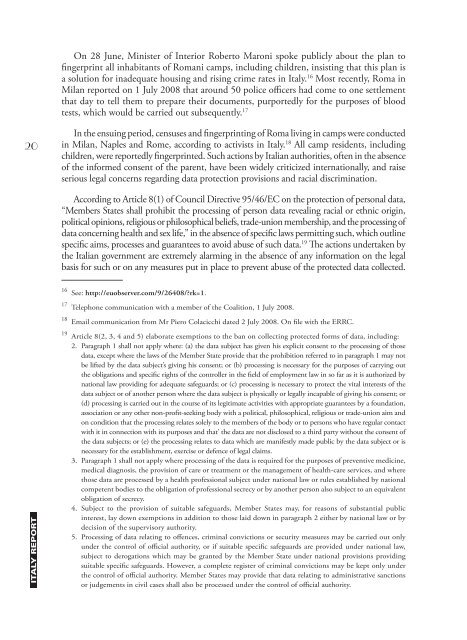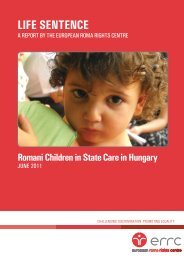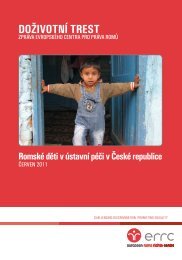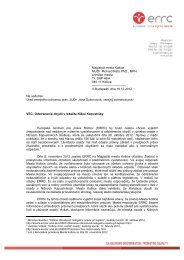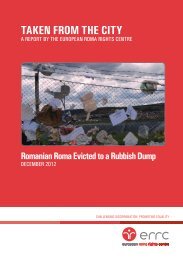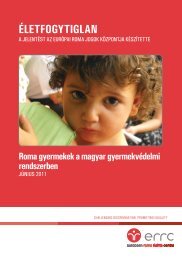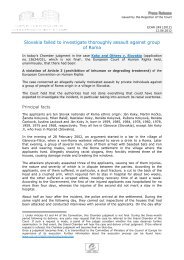security a la italiana sicurezza all'italiana securitate a la italiana
security a la italiana sicurezza all'italiana securitate a la italiana
security a la italiana sicurezza all'italiana securitate a la italiana
You also want an ePaper? Increase the reach of your titles
YUMPU automatically turns print PDFs into web optimized ePapers that Google loves.
20<br />
ITALY REPORT<br />
On 28 June, Minister of Interior Roberto Maroni spoke publicly about the p<strong>la</strong>n to<br />
fingerprint all inhabitants of Romani camps, including children, insisting that this p<strong>la</strong>n is<br />
a solution for inadequate housing and rising crime rates in Italy. 16 Most recently, Roma in<br />
Mi<strong>la</strong>n reported on 1 July 2008 that around 50 police officers had come to one settlement<br />
that day to tell them to prepare their documents, purportedly for the purposes of blood<br />
tests, which would be carried out subsequently. 17<br />
In the ensuing period, censuses and fingerprinting of Roma living in camps were conducted<br />
in Mi<strong>la</strong>n, Naples and Rome, according to activists in Italy. 18 All camp residents, including<br />
children, were reportedly fingerprinted. Such actions by Italian authorities, often in the absence<br />
of the informed consent of the parent, have been widely criticized internationally, and raise<br />
serious legal concerns regarding data protection provisions and racial discrimination.<br />
According to Article 8(1) of Council Directive 95/46/EC on the protection of personal data,<br />
“Members States shall prohibit the processing of person data revealing racial or ethnic origin,<br />
political opinions, religious or philosophical beliefs, trade-union membership, and the processing of<br />
data concerning health and sex life,” in the absence of specific <strong>la</strong>ws permitting such, which outline<br />
specific aims, processes and guarantees to avoid abuse of such data. 19 e actions undertaken by<br />
the Italian government are extremely a<strong>la</strong>rming in the absence of any information on the legal<br />
basis for such or on any measures put in p<strong>la</strong>ce to prevent abuse of the protected data collected.<br />
16 See: http://euobserver.com/9/26408/?rk=1.<br />
17 Telephone communication with a member of the Coalition, 1 July 2008.<br />
18 Email communication from Mr Piero Co<strong>la</strong>cicchi dated 2 July 2008. On file with the ERRC.<br />
19 Article 8(2, 3, 4 and 5) e<strong>la</strong>borate exemptions to the ban on collecting protected forms of data, including:<br />
2. Paragraph 1 shall not apply where: (a) the data subject has given his explicit consent to the processing of those<br />
data, except where the <strong>la</strong>ws of the Member State provide that the prohibition referred to in paragraph 1 may not<br />
be lifted by the data subject’s giving his consent; or (b) processing is necessary for the purposes of carrying out<br />
the obligations and specific rights of the controller in the field of employment <strong>la</strong>w in so far as it is authorized by<br />
national <strong>la</strong>w providing for adequate safeguards; or (c) processing is necessary to protect the vital interests of the<br />
data subject or of another person where the data subject is physically or legally incapable of giving his consent; or<br />
(d) processing is carried out in the course of its legitimate activities with appropriate guarantees by a foundation,<br />
association or any other non-profit-seeking body with a political, philosophical, religious or trade-union aim and<br />
on condition that the processing re<strong>la</strong>tes solely to the members of the body or to persons who have regu<strong>la</strong>r contact<br />
with it in connection with its purposes and that’ the data are not disclosed to a third party without the consent of<br />
the data subjects; or (e) the processing re<strong>la</strong>tes to data which are manifestly made public by the data subject or is<br />
necessary for the establishment, exercise or defence of legal c<strong>la</strong>ims.<br />
3. Paragraph 1 shall not apply where processing of the data is required for the purposes of preventive medicine,<br />
medical diagnosis, the provision of care or treatment or the management of health-care services, and where<br />
those data are processed by a health professional subject under national <strong>la</strong>w or rules established by national<br />
competent bodies to the obligation of professional secrecy or by another person also subject to an equivalent<br />
obligation of secrecy.<br />
4. Subject to the provision of suitable safeguards, Member States may, for reasons of substantial public<br />
interest, <strong>la</strong>y down exemptions in addition to those <strong>la</strong>id down in paragraph 2 either by national <strong>la</strong>w or by<br />
decision of the supervisory authority.<br />
5. Processing of data re<strong>la</strong>ting to offences, criminal convictions or <strong>security</strong> measures may be carried out only<br />
under the control of official authority, or if suitable specific safeguards are provided under national <strong>la</strong>w,<br />
subject to derogations which may be granted by the Member State under national provisions providing<br />
suitable specific safeguards. However, a complete register of criminal convictions may be kept only under<br />
the control of official authority. Member States may provide that data re<strong>la</strong>ting to administrative sanctions<br />
or judgements in civil cases shall also be processed under the control of official authority.


